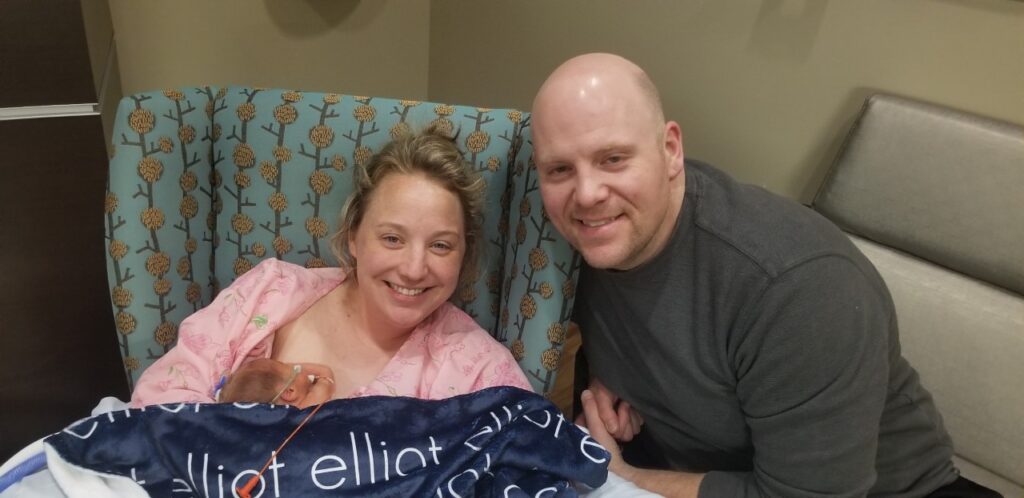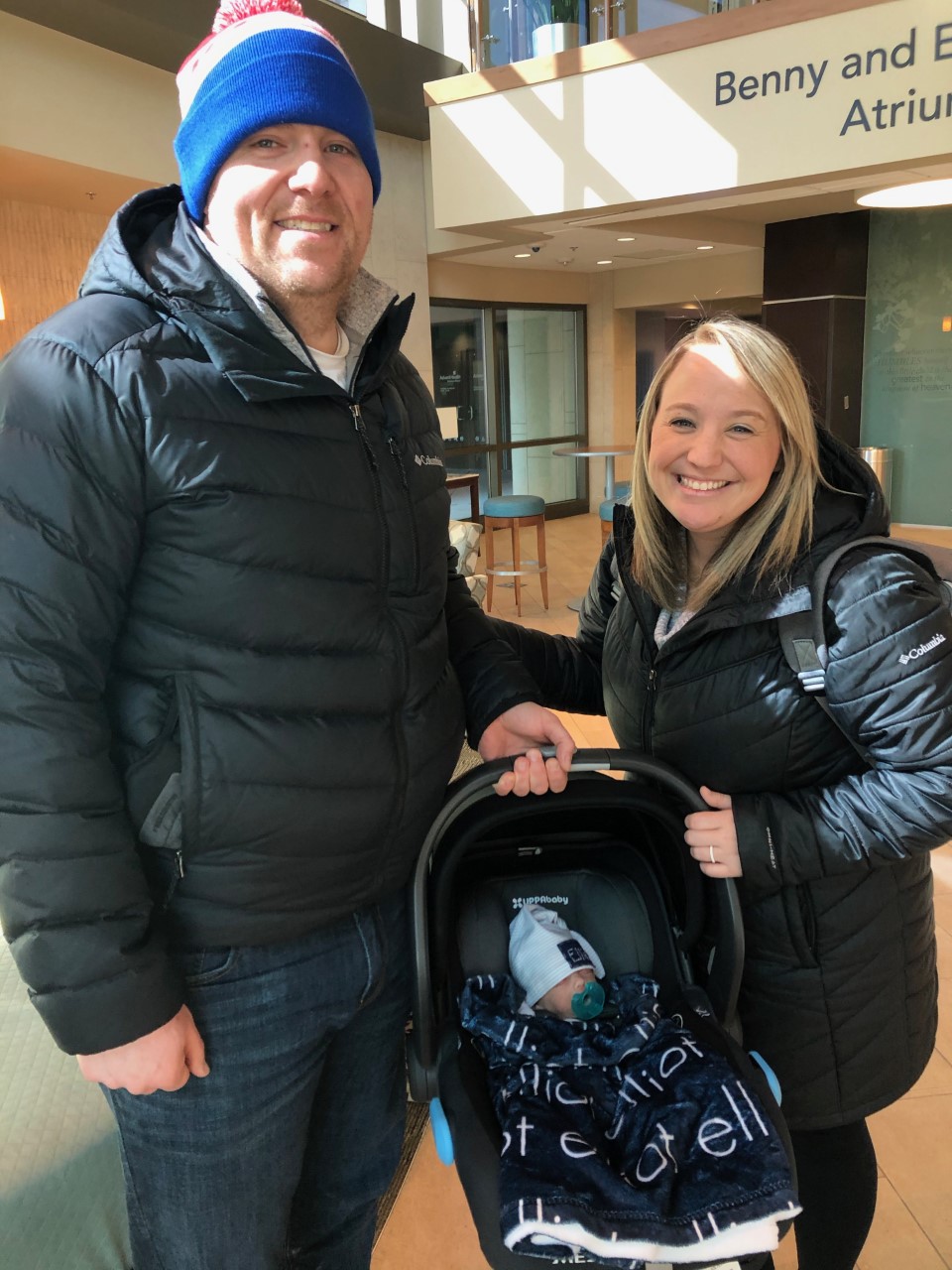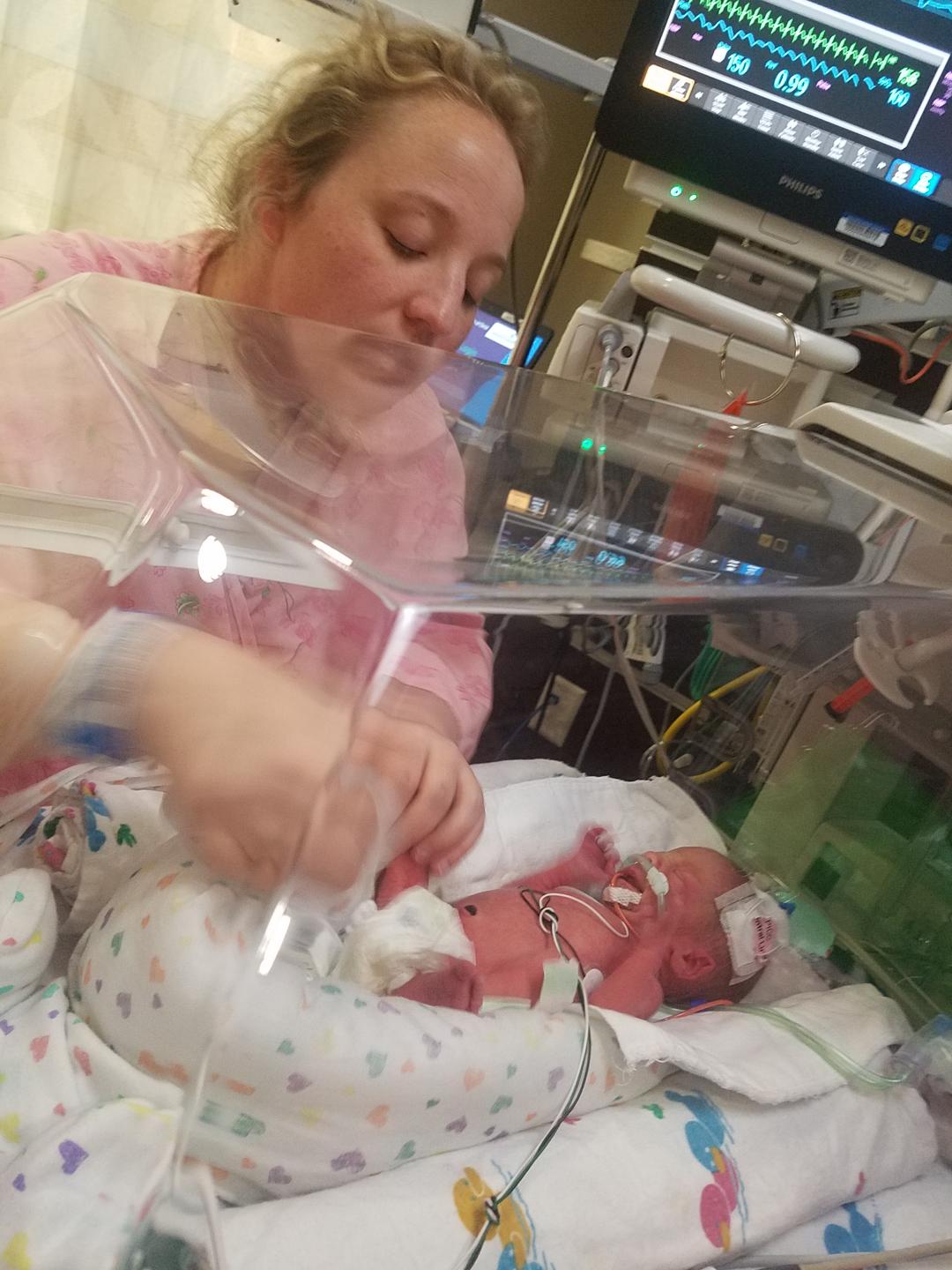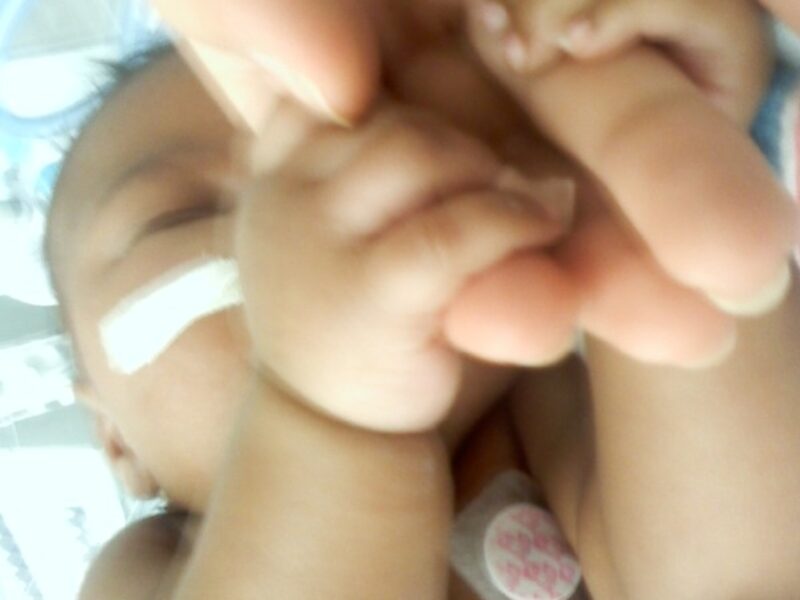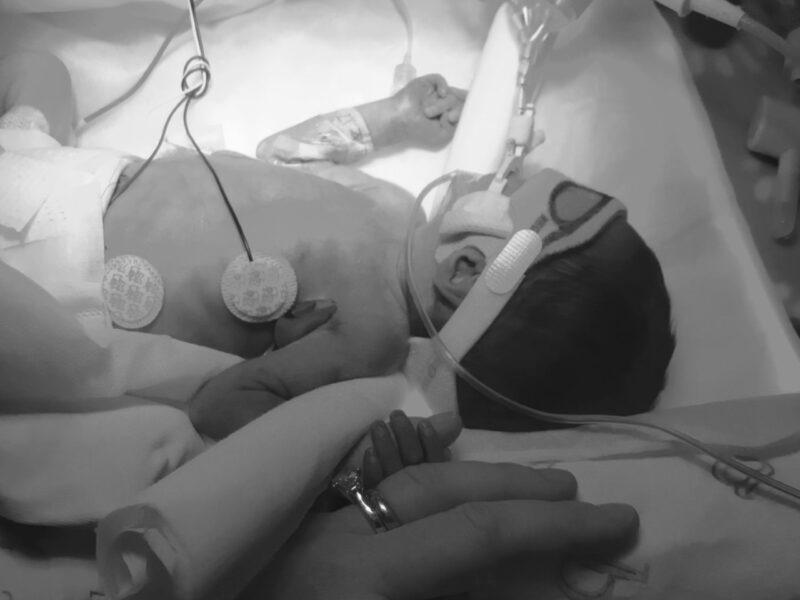Please tell us about your NICU experience
Our NICU journey started off completely unexpected. I had a great 32 week check up on Friday morning and by Saturday evening I was having contractions and rushed to the hospital. Upon arriving at the hospital, they realized my blood pressure was very high and I was starting to have issues with my kidney and liver function. I was told that they would try and stop the contractions as well as get the blood pressure under control and so we would see in the morning. At 9:29 my son was born via emergency c-section.
Our NICU was absolutely amazing. All of the nurses and doctors were incredibly understanding of our situation and answered our millions of questions, reassured us when we did not feel hopeful and provided resources to help us through this time. Some of the things that truly stuck out to us was that they decorated our son’s room, allowed us to bring things in to make it feel more like home, and celebrated different events that we would have at home. Our son was in the NICU during the Kansas City Chiefs Superbowl and they decorated the entire halls, made onesies for all of the babies, took pictures of them and decorated their doors. It might have seemed small to someone else, but to us it was so fun and took away some of the fear and sadness we had with our son being in the NICU.
As crazy as it sounds, we were sad to leave our NICU after my son had been there for 35 days. That had been our home during the hardest time in our lives and we had made amazing relationship with our nurses, and they had helped us so much. They truly taught us how to be parents.
What was the hardest part about your NICU stay?
The hardest part about our NICU stay was leaving my son every night. It was something that I don’t wish on my worst enemy. To leave your newborn in the hospital while others care for them is the hardest thing I have ever done. I would go to the NICU around 7-7:30 every morning to be there before his 8:00 cares and then my husband would get off work around 5 and come up and then we would stay until shift change around 7-7:30. My life was the NICU and to go home and not have a child to care for was incredibly difficult. Unfortunately, you get lots of comments from those that have never had a NICU stay like “Oh that must be so nice to get uninterrupted sleep,” or “You won’t sleep once they get home so enjoy it now.” Again, they could never understand but they don’t understand that you don’t get sleep – I still get up to pump and every night I would wonder if he was being taken care of and was he crying or was he okay
How did you care for your mental health while your baby was in NICU?
This question always finds a way to make me laugh because I am a mental health therapist and I did not care for my mental health during our NICU stay. I laugh because there are so many things that I didn’t recognize while we were there and how much I was struggling but I was honestly just surviving. I didn’t want to take time away from my child to deal with my mental health so for that time I just did what I could control and that was be with my son as much as I possibly could.
Fortunately, once my son was discharged, I reached out to my therapist to start processing my birth trauma and my son’s NICU stay. And for the past two years, I have found a combination of therapy and medication have been truly remarkable for my mental health and continue to make it a priority so that I can be a better mom.
Do you feel like you had all of the resources that you needed both while your baby was in the NICU and after discharge?
I would say we definitely were given a lot of resources. Our hospital provided a support group for parents. I never attended due to not wanting to be away from my son, but it was a resource. There was also an amazing NICU social worker who checked in on us often and provided resources when needed. After discharge, we were able to call the NICU if we had questions, which we did. As well as support from our pediatrician’s office.
What advice or tips do you have for couples who are currently in the midst of their NICU journey to help keep them on the same page/to keep their relationship strong?
A big realization that my husband and I both had was that we both experienced trauma, but we both experienced in two very different ways. We also are two very different people and how we process hard things and need to work through them are very different. I found myself at one point feeling like my husband did not want to come to the hospital and be with our son but rather my husband was struggling and was doing what he could control. He couldn’t control our son coming home, but he could continue to provide for our family and was able to be more present once our son came home.
Once we were able to communicate our thoughts and feelings with eachother about how we were processing what happened and what we needed to do to care for ourselves, the understanding of one another was so helpful for our relationship. So a big tip would be to communicate to one another what you are thinking and how you are feeling as well as recognize that you each are going to handle it differently and that is okay.
As a Licensed Clinical Professional Counselor, what is your approach when caring for patients who have experienced any sort of birth trauma? Has your own NICU experience affected the way that you counsel your patients?
Once I am aware that someone has had any sort of birth trauma and they are coming to therapy because of that, I focus first on how to help them with their present symptoms (depression, anger, anxiety, etc.) I want to make sure that before we start processing any part of the birth trauma, we are establishing a good core of emotional regulation skills to help them with their day-to-day life. Then once we have established those skills and we have seen a good regulation of symptoms, then I would discuss with them different options when it comes to therapy modalities of processing trauma. I am trained in Eye Movement Desensitization & Reprocessing (EMDR) therapy. It is an effective psychotherapy that is used to help people recover from trauma and other distressing life experiences. This approach is not for everyone, but I like to thoroughly discuss it with my clients as I have found it very effective with my trauma clients.
My NICU experience has definitely affected the way I am as a therapist now in multiple ways. Prior to my son being born, I was a child therapist. Due to my son’s early arrival as well as COVID, I started providing teletherapy only so seeing children became very difficult. It was also during my maternity leave that I learned more and more about maternal health and recognized that I wanted to do more to help birthing individuals, parents, caregivers. The transition into parenthood is incredibly stressful and when you add on struggling mental health, it just makes you feel like you’re failing when you are not at all. My goal is to be able to provide to other parents, the things that I wish I would have had. I want to be able to be in the NICU with families and helping them through the hardest time in their lives. A lot of them at this time will not be able to process what they are going through, but to start the process of acknowledging their thoughts and feelings, validate them, and then learning how to deal with them can be incredibly valuable as they are in the NICU.
Is there anything else that you would like to share?
As much as I would have loved to not have been in the NICU, it also taught me so much that I can see now. My son is incredibly strong and can get through anything. His amazing perseverance and strength continue to get him through any battle that he deals with now and will help in his future. My husband is an amazing caregiver and strength in our family, I constantly call him our rock. Our relationship strengthened through this time, and I will always be thankful for that. I learned that I can handle more than I think I can. I also learned that it’s okay to be thankful and grateful for an experience but also extremely terrified and sad about it at the same time. It’s okay to hold two feelings for the same experience.
